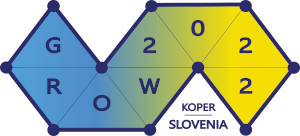Jungho Ahn - Bounds for the twin-width of graphs
Jesse Beisegel - Characterizing Graph Classes with Convexity
Manoj Belavadi - Reconfiguration of Vertex Colouring and Forbidden Induced Subgraphs
Jan Bok - Hardness constructions for graph covering problems with semi-edges
Carolina Lucía Gonzalez - Locally checkable problems parameterized by treewidth, clique-width and mim-width
Michel Habib - LexCycle on Modules
Chinh T. Hoang - Critical (P3+ℓ P1)-free and critical (gem, co-gem)-free graphs
Meike Hatzel - Generating Strongly 2-Connected Digraphs
Nikola Jedličková - List homomorphism problem for signed graphs
Gyula Y. Katona - Polynomial algorithm to compute the toughness of graphs with bounded treewidth
Nina Klobas - The complexity of computing optimum labelings for temporal connectivity
Tuukka Korhonen - Computing Tree Decompositions with Small Independence Number
Jan Kratochvíl - Computational complexity of the list version of graphs covers
Philipp K. Krause - Constant-time connectivity tests
Stefan Lendl - On Structural Parameterizations of Continuous Facility Location Problems on Graphs
Vadim Lozin - Graph parameters, implicit representations and factorial properties
Andrea Munaro - Structural and algorithmic results for mim-width and sim-width
Christophe Paul - The mixed search game against an agile and visible fugitive is monotone
Evangelos Protopapas - Tree-layout based graph classes: the case of proper chordal graphs
Peter Rossmanith - Evaluating Restricted First-Order Counting Properties on Nowhere Dense Classes and Beyond
Robert Scheffler - Semi-Proper Interval Graphs
Giannos Stamoulis - Model-Checking for First-Order Logic with Disjoint Paths Predicates in Proper Minor-Closed Graph Classes
Stefan Szeider - From Twin-Width to Propositional Logic and Back
Nicolas Trotignon - From even-hole-free graphs to treewidth
Sebastian Wiederrecht - Killing a Vortex
Viktor Zamaraev - Implicit Representations of Graphs and Randomized Communication
Download current event:
Calendar file
In order to enable an iCal export link, your account needs to have an API key created. This key enables other applications to access data from within Indico even when you are neither using nor logged into the Indico system yourself with the link provided. Once created, you can manage your key at any time by going to 'My Profile' and looking under the tab entitled 'HTTP API'. Further information about HTTP API keys can be found in the Indico documentation.
Additionally to having an API key associated with your account, exporting private event information requires the usage of a persistent signature. This enables API URLs which do not expire after a few minutes so while the setting is active, anyone in possession of the link provided can access the information. Due to this, it is extremely important that you keep these links private and for your use only. If you think someone else may have acquired access to a link using this key in the future, you must immediately create a new key pair on the 'My Profile' page under the 'HTTP API' and update the iCalendar links afterwards.
Permanent link for public information only:
Permanent link for all public and protected information:
Please use CTRL + C to copy this URL
Detailed timetable

